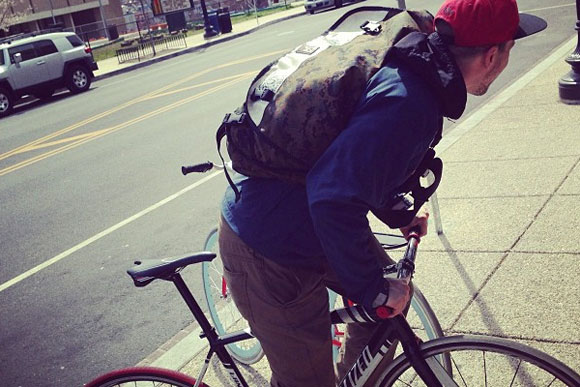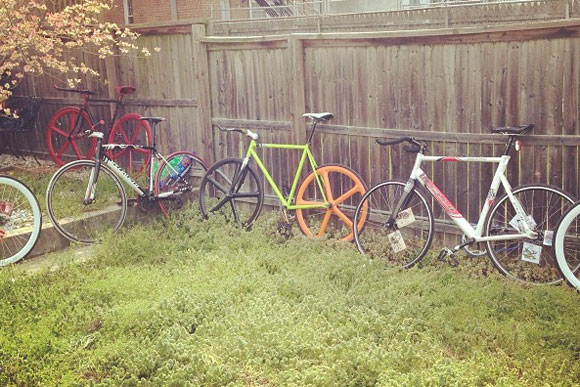Adrienne Sheares was crunching an evening deadline when her laptop's cord blew. "My MacBook charger started to fray and began sparking. Needless to say, I needed a charger to finish my work," Sheares recalls. Unfortunately, her friends were "PC people," so she could not borrow a spare. She also didn't have the time to drive to the Apple Store in Georgetown, find a parking space and buy a new one. "I decided now was time to test out the app." "The app" is a new smartphone application she co-founded, known as
Urban Delivery.
Fast-forward two minutes, and Sheares was glued to her smartphone, watching a GPS-tracked icon make its way towards Georgetown from Adams Morgan. Behind this icon was a real, live bike messenger. Once at the Apple Store, Urban Delivery sent Sheares a notification. "I also got a call from the biker because he wanted to make sure he was buying the correct charger. After he made the purchase, I saw another popup with the price of the charger." Forty minutes later, with battery to spare, a brand-new laptop charger was in her hand.
Urban Delivery was founded this year by CEO Ron Cade and Sheares, the chief marketing officer. In an effort to bolster D.C.'s shrinking bike messenger community (as well as make some money), the duo decided to establish a mobile, bike-based delivery service that reached out to a broader audience beyond Capitol Hill.
"Bike messenger-ing is a longstanding industry that culturally significant for D.C.," says Cade. "It underpins the city's power base. As long as there have been politicians, there have been messengers. They started on horses and evolved to bikes."
"As long as there have been politicians, there have been messengers. They started on horses and evolved to bikes."
Yet the popularity of and livable wages for bike messengers have been dwindling for a number of years. Last spring, the
Washington City Paper reported an estimated 100-150 bike messengers remained in the area. Other estimates are much lower. With computers, email, and cargo-ready vehicles, bike messenger jobs and the heralded "
courier culture" have moved out of the District, making the relevance of the occupation increasingly questionable. Some lobbying firms have stopped using the service altogether.
Nevertheless, some historical names still remain. Quick Messenger Service DC (QMS), for instance, advertises over five million trips couriering documents for accounting and legal firms, non-profits, lobbyists and government since its start in 1985. But even their services have become more dependent on the use of automobiles for delivery, ranging from mopeds to van couriers. Similarly,
All State Courier (established 1986) has been using fleets of vehicles for many of its deliveries.
Reinvigorating the industry
Despite the hardships of the bike messenger community, Cade and Sheares think their smartphone application has found the solution. "Now, we are overlaying this foundation with the latest in consumer technology. Our goal is to reinvigorate the industry by shifting the market and injecting 21st-century technology," says Cade.

And it might actually work. Bells and whistles aside, what's actually changed is in the service provided. Urban Delivery, which officially launched Mother's Day, fulfills an entirely different market than commercial couriers. It is built for the average consumer. Whether you're in desperate need of a party favor (yes, they actually do deliver beer), a dry cleaning pickup, or that emergency electronics fix, Urban Delivery has you covered in under an hour. And those are just a few of the services on Urban Delivery's list starting at $12.99.
It's also a luxury for its users. A quick dry-cleaning pickup would include a 10 percent surcharge if Urban Delivery's courier pays for your items with a business-provided debit card, a $3 surcharge if it's past 5 p.m., and an automatic 20 percent tip.
"Yes, we pay more [than competitors]," says Sheares. "We need to incentivize them to want to take jobs."
But why use a bike courier at all? For one thing, they're faster, says Sheares. "They can weave in and out of traffic and don't have to worry about parking. So they don't have to go through the same hassles as a car. It's also good for the environment." Besides, the couriers tapped to ride for Urban Delivery are hungry for work, wired, and tech-savvy enough to communicate with Urban Delivery at any time.
"D.C. is small, but it is not necessarily convenient," says Cade. "There is traffic, parking is a nightmare and public transit can be unpredictable. Leaving the desk is not always an option and spare time is valuable. That is where we come in."
Meet the Messengers
Urban Delivery has contracted 16 couriers prior to launch. "A good deal of the bikers have a courier background, but there are a lot of them who are just bike enthusiasts and know the city in and out, and are super-fast. We also have a longboarder who zooms down the street," says Cade.
Urban Delivery couriers are compensated per delivery and they also receive gratuity. They're encouraged to take as many orders as they can.

Gerald, AKA "GB_Chillin", a first time courier, says, "This is my first job as a courier…In comparison to my other two jobs, this could be very profitable...and I get to ride my bike really fast all day." Gerald still thinks Urban Delivery has a ways to go, but sees success in its future for customers and employees.
"I mean, it's not about the money for most of us; it's about the ride," says a courier who goes by "Peace." This is about bringing something different to D.C."
Another rider going by the name Lupe says that he imagines late-night food delivered by bike is going to be a hit.
For safety and liability reasons, Urban Delivery says they require background checks and training for their couriers, and they provide insurance.
"I ride fast and efficient. I've seen too many careless bike accidents. Traffic can work to a biker's advantage if your timing is in tune with your speed and momentum. A messenger won't last long if he is under a car," says Gerald.
Of course, the question remains why such an antiquated profession is still needed. But Urban Delivery finds the answer all too obvious. "D.C. needs this because we're a busy city," says Sheares. "There are so many people on the go, working long hours, and too tired to brave the metro or don't want to stop what they're doing to hop in a cab and get some things they need."